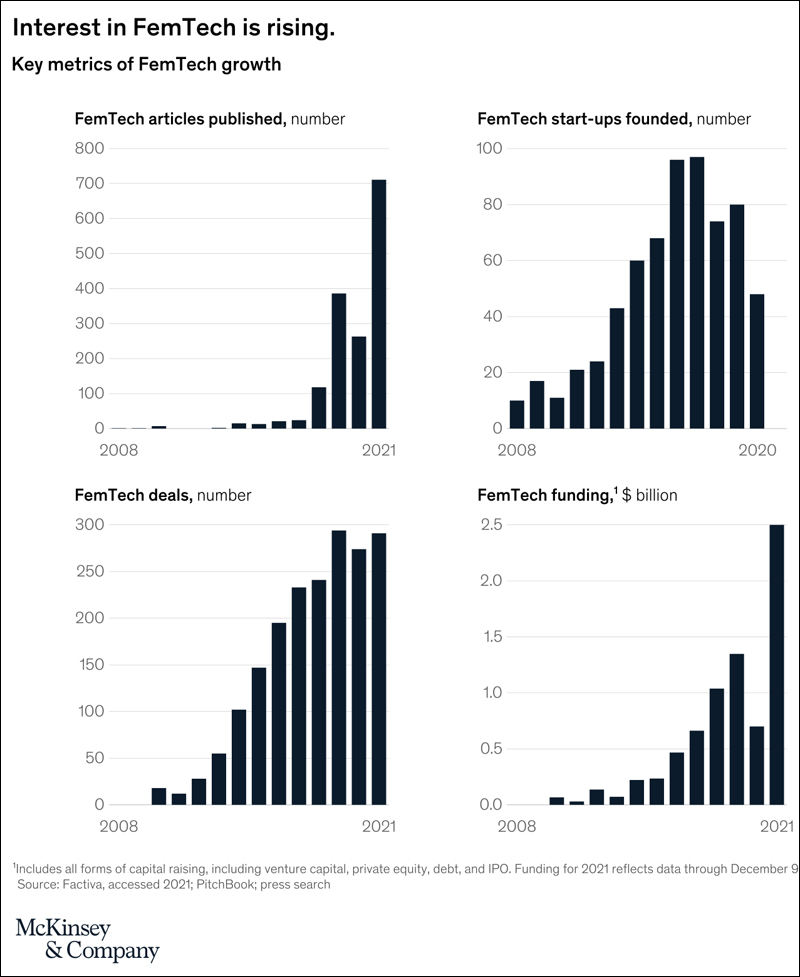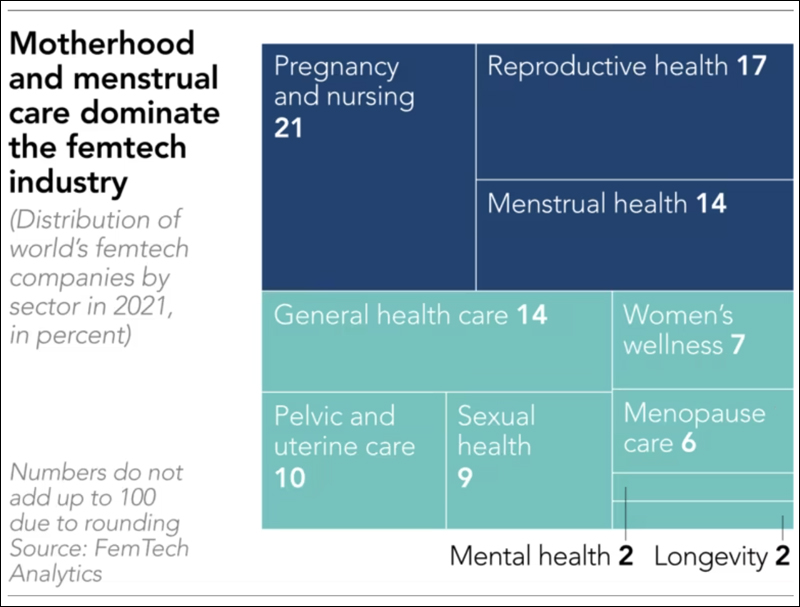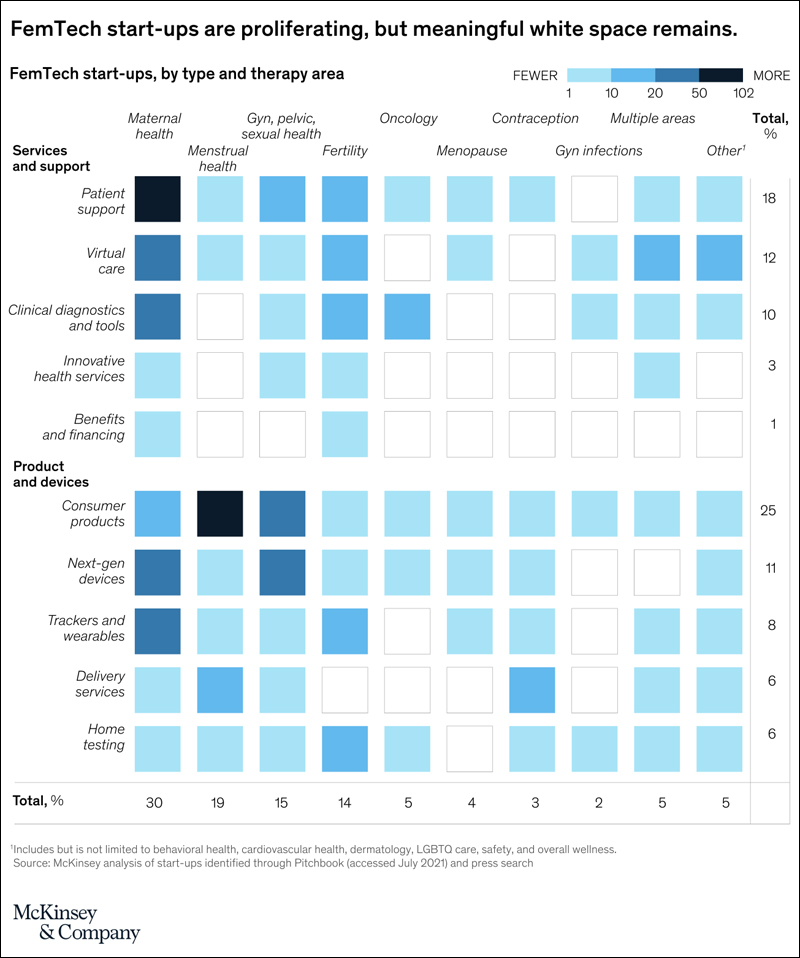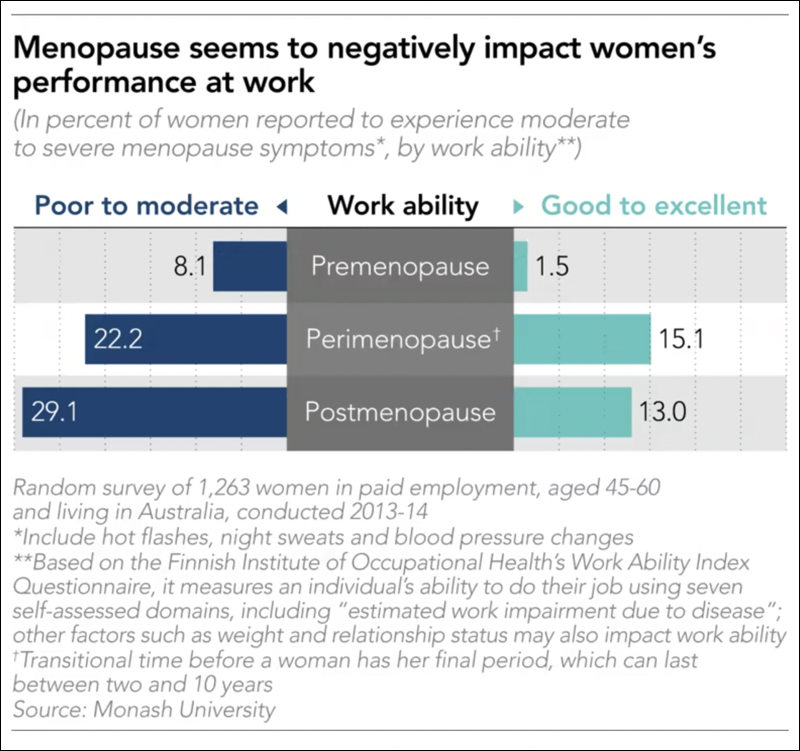By using technology and consumer-centric solutions to address menopause, the revolution is paving the way for more female leaders in the future, writes Adarsh
In the summer of 2009, Danish entrepreneur Ida Tin sat with her mobile phone in one hand and a thermometer in the other. She was noting down her temperature on an Excel sheet to maintain a chart around her period cycle. It amazed her that humans had explored technology enough to scourge the oceans and walk on the moon, and yet hadn’t managed to design an app that could track a woman’s menstruation cycle. But instead of sitting and moping about it, she went ahead and made it herself.
In 2013, she founded Clue, a period and ovulation tracking app, based in Germany. Three years later, in 2016, she coined the word ‘FemTech’.
What Is FemTech?
In simple words, FemTech refers to any software, product or service that uses technology to help women lead healthier lives.
It offers a wide array of solutions to improve healthcare for women across a number of female-specific conditions, including maternal health, menstrual health, pelvic and sexual health, fertility, menopause, contraception, and also several general health conditions that affect women disproportionately or differently (for instance, osteoporosis or cardiovascular disease).
Slowly but steadily, the global FemTech industry has expanded over the last five years. Public awareness, company formation and funding has been on the rise. Progyny, a US-based company that manages fertility benefits for employers, went public a few years ago with a valuation well over $1 billion. As of today, its market capitalization is around $4 billion. Maven Clinic, another US-based virtual clinic that focuses on women’s health, was recently valued at over $1 billion.
Disrupting Healthcare
The FemTech revolution is definitely redefining healthcare as we know it. Through brick-and-mortar clinics and direct-to-consumer prescription delivery services, women now have better and faster access to healthcare, right from the comforts of their homes. Trackers and wearables as well as at-home diagnostics are also empowering women to take control of their health and health-related data.
Stigmatized topics and communities around the world are also being addressed. There are several companies focused on topics such as menstrual health, sexual health, pelvic care, and menopause while there are many more delivering care specifically for subpopulations that are Black women, LGBTQ+ populations and women in low- and middle-income countries.
Female Entrepreneurs
According to a McKinsey study, over 70% of the FemTech companies in the USA have at least one female leader as opposed to the 20% which is aware and focussed on women empowerment helps them in the norm in new companies. Moreover, a sector that is gender realizing their potential as inventors, investors, physicians and founders. This unquestionably bodes well for society. The same McKinsey research also revealed that when inventors set out to solve a health problem, male inventors are more likely to solve for a male-oriented condition while women-led teams focus on solving across genders.

The stigma and effects of menopause is also being addressed through the FemTech revolution. It usually happens at an age when women are most likely to step into senior roles. This has a significant impact on the number of women at higher positions as well as the quality of their experiences within the organization. By using technology and consumer-centric solutions to address menopause, the revolution is paving the way for more female leaders in the future.

Social Stigma
In a country like India where majority of the population is uneducated, unemployed or below the poverty line, the task is tougher. Take menstrual hygiene, for instance. Anything related to the female reproductive system is spoken about in whispers and the knowledge is often limited to myths and superstitions. Instead of proper sanitation or healthcare, menstrual health is limited to beliefs such as women should not eat mango pickle while on their period.
A recent survey showed that 78% of urban Indian women use sanitary menstrual hygiene products but only 48% of rural women have access to such products during menstruation. There are several reasons for this. Reluctance to adopt a new product, lack of awareness, high costs as well as government policies and regulations.
Around the world, 1 in every 10 women suffers from PCOS, a hormonal condition where small follicles form on the inside of the ovaries. This can lead to weight gain, irregular periods and facial hair. A study reveals that in India, the count is 1 in every 5 women.
But treatment is a major challenge and the main reason is that, like menstruation, this condition too is traditionally seen as taboo. It is not talked about with male family members who happen to be the decision-makers in most households. Despite the condition’s prevalence in India, the survey also revealed that 25% of the Indian women did not know anything about PCOS while 65% were unaware of the symptoms.
Indian Startups
There are several Indian startups which have been working tirelessly to improve the state of female healthcare and hygiene in the country. MyAva, an Indian FemTech startup, is streamlining PCOS treatment by educating women and giving them access to gynecologists, nutritionists and fitness coaches. Another app, Sirona, focuses on products and conversations around feminine hygiene problems. It aims to improve hygiene issues that women face from puberty to menopause.

Proactive For Her offers teleconsultations and offline services for problems related to skin and haircare, PCOS, menstrual health, sexual health, and others. Healthfab’s flagship product GoPadFree is India’s first reusable period panty. It aims at helping low-income groups have better access to menstrual hygiene while also creating a more plastic-free society.
Hera prioritises women’s health by focusing on general, pregnancy, and sexual health. It provides women’s wellness products based on clean nutrition, health checks, and follow-up care. That Sassy Thing is a menstrual and sexual wellness brand that provides all natural, dermatologically tested, safe products and contains vagina-friendly ingredients.

Healofy aims to help the pregnant and parenting community across key life stages, starting from preconception to early motherhood.
Different Approach
Considering the social and economic differences across the stratas in the country, the FemTech revolution needs to take a two-pronged approach for India. While it is necessary to keep pace with the world in terms of technological advancement, it is also important to focus on the educational aspect. As much as there is a need to take the technology to the consumers, it is also imperative that more people realize the importance and intricacies of women’s health.
As far as India is concerned, the FemTech revolution is still in its infancy. But the good news is that the revolution is well and truly underway!
In case you missed:
- How India broke its Paralympics Medal Tally by using Assistive Tech
- Why is Indian Education Sector facing Record Number of Cyberattacks?
- India’s AI Ambitions in the Spotlight amidst DeepSeek’s Disruption
- 15 Billion Transactions a Month! How UPI is transforming India’s Digital Economy
- How AI is Revolutionizing Combat for Indian Defence Forces
- India rises to 2nd Place in Global Smartphone Sales, 3rd in Market Value
- India announces First Venus Mission set for 2028
- New Year, New Scam: All You Need to Know About Brushing
- OpenAI is now Focussing on Superintelligence!
- Microsoft enhances AI Copilot with Voice, Vision & Deeper Thinking










4 Comments
Its good info for women.
Hello Dear, are you actually visiting this web site daily, if
so afterward you will definitely obtain good experience.
Have a look at my website – 광주유흥
Hi everybody, here every one is sharing these kinds of knowledge, so it’s nice to read this weblog, and I used to pay
a quick visit this webpage daily.
Hi there it’s me, I am also visiting this website on a regular basis, this web site is
genuinely good and the users are really sharing good thoughts.